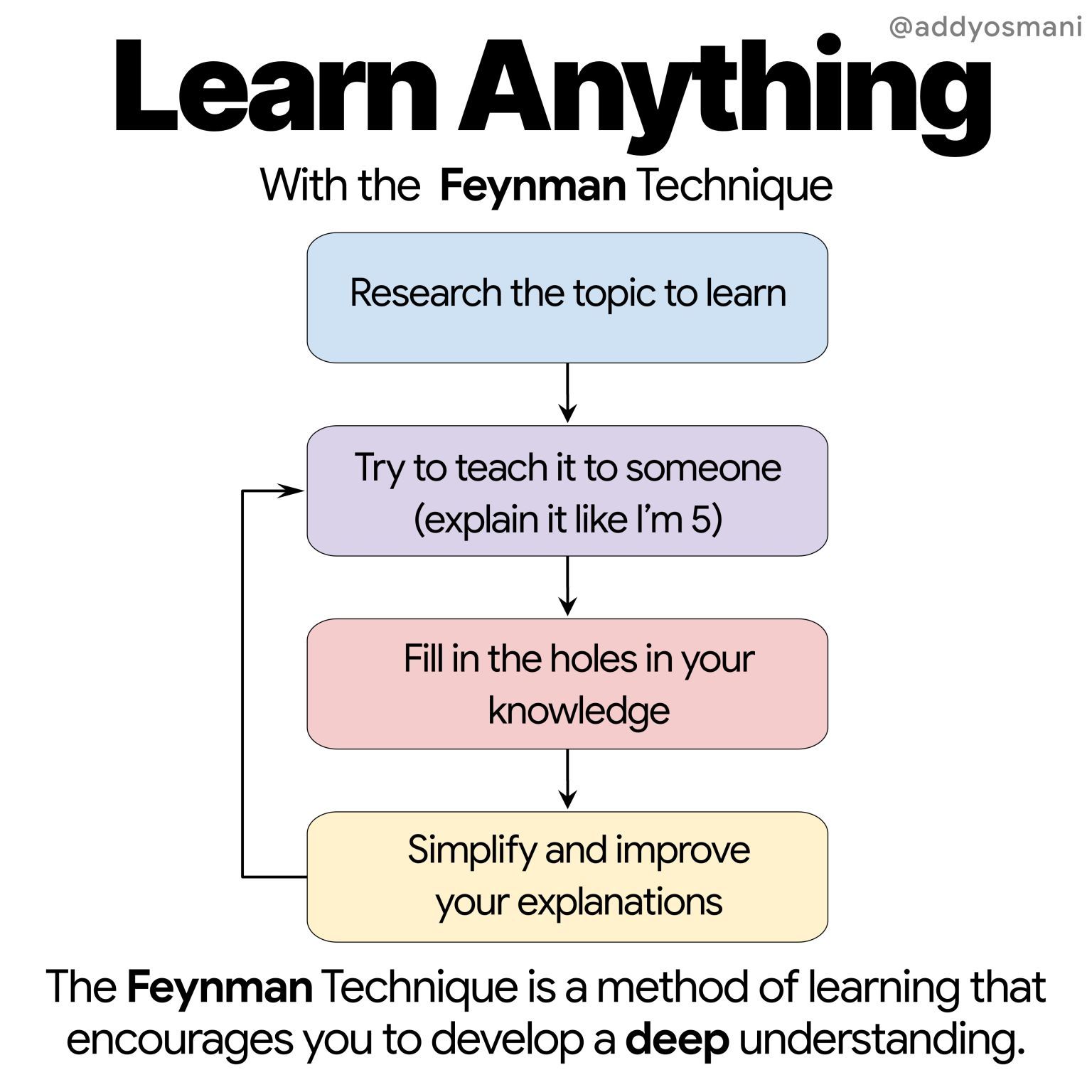所写即所学,所写即所得
发布于
1777次点击
关于作者:
Addy Osmani 是一位软件工程师,也是 Google Chrome 的工程主管。他是开发者体验主管,致力于让 Web 变得快速、低摩擦,以便开发者进行构建。
Addy Osmani 今年出版了一本书《Learning JavaScript Design Patterns: A JavaScript and React Developer's Guide 2nd Edition》(https://www.amazon.com/Learning-JavaScript-Design-Patterns-Developers/dp/1098139879) ,这本书主要讲的是 JS 中的设计模式,讲解的全面细致,值得一读。
Addy Osmani 写的这篇文章的链接地址(https://addyosmani.com/blog/write-learn/)
中文版
写下你所学,这会促使你更好地理解主题。有时只有在向他人解释时,我们才会意识到自己知识的缺口。
写下你所学不仅仅是一种文档记录的方法,它是加深理解和揭示自己知识缺口的强大工具。这种实践促使我们更深入地探索主题,并以一种连贯而精确的方式表达自己的思想。
通过写作学习
-
探索:写一篇关于一个主题的文章有时需要全面探索这个主题。这通常会导致发现新的见解和联系,这些在仅仅阅读或听取时可能不明显。
-
表达:把思想用语言表达出来,迫使一个人澄清自己的理解。这个表达过程有助于确定理解可能模糊或不完整的地方。
-
反思:写作允许反思主题,使学习者能够将新信息与现有知识相连接。这种综合有助于创建一个更强大、更互相连接的对主题的理解。
-
揭示缺陷:有时,写作的行为揭示了知识缺乏或不一致的领域。认识到这些差距是填补它们并实现更完整理解的第一步。
写作的好处
-
增强记忆力:写下你学到的东西有助于更长时间地记住信息。将思想转化为文字的过程会涉及多种认知能力,加强记忆。
-
提高沟通能力:定期写作各种议题可以增强有效传达复杂思想的能力。这种技能无论在职业生活还是个人生活中都非常宝贵。
-
个人成长:写作学习的实践鼓励成长心态。它培养好奇心、批判性思维和愿意涉足挑战性议题的意愿。
费曼技巧
费曼技巧是以物理学家理查德·费曼命名的一种方法,旨在帮助个人深入学习和理解各种学科。它与写下所学内容的实践相吻合,其原则可以概括为以下步骤:
-
选择一个概念:选择一个你想要理解的概念或主题。
-
向孩子讲解:尝试像向孩子讲解一样解释这个概念。使用简单的语言,避免行话。
-
发现差异并回到原始材料:如果发现解释有困难的地方,回到原始材料填补知识空缺。
-
简化和使用类比:创造类比和使用简单的语言,使概念更易于理解和接受。
-
回顾和完善:不断回顾和完善你的解释,直到能够用最简单的术语表达概念。

费曼技巧强调清晰简洁的沟通的重要性,反映了通过写作来表达所学内容的过程。这两种做法都鼓励对主题的深入和全面的理解。
写作和成功中的持续一致
激发写作或任何其他创造性努力的兴趣可能会点燃动力,但是持续一致才是真正推动成功的火焰。定期写作,无论是否受到灵感的启发,都会带来长期的成长、掌握和成就。
持续一致的重要性
-
建立习惯:持续写作有助于形成习惯。习惯一旦形成,就会自动化,需要更少的努力来维护。随着时间的推移,这使得写作过程更加自然和愉快。
-
渐进式改进:持续的实践会带来渐进式的改进。每个写作会话可能会为技能做出微小的提升,但随着时间的推移,这些小的收获会累积成为重要的增长。
-
保持势头:持续一致有助于保持势头。与写作的定期互动可以保持思路的流畅和创造性的发挥,减少启动的阻力。
-
实现长期目标:在许多其他领域一样,写作中的成功通常是长期持续努力的结果。持续一致将日常行动与长期目标对齐,为成功铺平了道路。
持续一致的挑战
-
克服拖延症:拖延症可能是持续一致的重要障碍。制定一个定期的计划、创造一个有利的环境,以及关注过程而不是结果,可以帮助克服这个挑战。
-
处理疲劳:持续写作并不意味着不休息或不进行自我关怀。平衡是预防疲劳的关键。知道何时休息和充电与知道何时向前推进同样重要。
-
管理期望:并不是每个写作会话都会产生杰作。接受不完美,并将重点放在写作本身而不是即时结果上,可以培养与这门手艺更健康的关系。
保持持续一致的策略
-
设定现实目标:将长期目标分解为更小、可实现的里程碑。关注进步而不是完美。
-
创造日常:建立定期的写作日常可以创建一个支持持续一致的结构。
-
寻求责任:与朋友分享目标或加入写作小组可以提供鼓励和责任感。
-
庆祝进展:即使是小的进展也要承认和庆祝,这可以创造积极的强化和继续前进的动力。
结论
写作关于你所学到的东西,使用费曼技巧等技术,以及在实践中保持持续一致这些相互关联的实践可以促进更深层次的理解、技能发展和长期成功。
在信息丰富的环境中,深入学习、清晰表达和持续坚持的能力是一项有价值的技能。这些实践不仅增强个人和职业成长,而且还为终身好奇、探索和成就之旅做出了贡献。
英文版
Write about what you learn. It pushes you to understand topics better. Sometimes the gaps in our knowledge only become clear when explaining things to others.
Writing about what you learn is more than just a method of documentation; it's a powerful tool for deepening understanding and revealing the gaps in one's knowledge. This practice pushes us to explore topics more thoroughly and to articulate their thoughts in a coherent and precise manner.
Learning Through Writing
-
Exploration: Writing about a subject can in cases require a comprehensive exploration of the topic. This often leads to uncovering new insights and connections that might not be apparent through mere reading or listening.
-
Articulation: Putting thoughts into words forces a person to clarify their understanding. This process of articulation helps in identifying areas where the understanding might be vague or incomplete.
-
Reflection: Writing allows for reflection on the subject matter, enabling the learner to connect new information with existing knowledge. This synthesis helps in creating a more robust and interconnected understanding of the subject.
-
Revelation of Gaps: Sometimes, the act of writing reveals areas where the knowledge is lacking or inconsistent. Recognizing these gaps is the first step towards filling them and achieving a more complete understanding.
The Benefits
-
Enhanced Retention: Writing about what you learn helps in retaining the information for a longer time. The process of translating thoughts into words engages multiple cognitive faculties, reinforcing memory.
-
Improved Communication Skills: Regularly writing about various subjects enhances the ability to communicate complex ideas effectively. This skill is invaluable in both professional and personal life.
-
Personal Growth: The practice of writing about learning encourages a growth mindset. It fosters curiosity, critical thinking, and a willingness to engage with challenging subjects.
The Feynman Technique
The Feynman Technique is a method named after the physicist Richard Feynman, designed to help individuals learn and understand subjects deeply. It aligns well with the practice of writing about what you learn, and its principles can be summarized in the following steps:
-
Choose a Concept: Select a concept or topic you want to understand.
-
Teach It to a Child: Try to explain the concept as if you were teaching it to a child. Use simple language and avoid jargon.
-
Identify Gaps and Go Back to the Source Material: If you find areas where your explanation falters, go back to the source material to fill in the gaps.
-
Simplify and Use Analogies: Create analogies and use simple language to make the concept more relatable and easier to grasp.
-
Review and Refine: Continuously review and refine your explanation until you can articulate the concept in the simplest terms possible.

The Feynman Technique emphasizes the importance of clear and simple communication, mirroring the process of writing about what you learn. Both practices encourage a deep and thorough understanding of the subject matter.
Consistency in Writing and Success
While motivation might ignite the spark of interest in writing or any other creative effort, it's consistency that truly fuels the flame of success. The act of writing regularly, regardless of inspiration, leads to growth, mastery, and achievement in the long run.
The Importance of Consistency
-
Building Habits: Writing consistently helps in forming a habit. Habits, once established, become automatic and require less effort to maintain. This makes the process of writing more natural and enjoyable over time.
-
Progressive Improvement: Consistent practice leads to incremental improvements. Each writing session may contribute a small enhancement in skill, but over time, these small gains accumulate into significant growth.
-
Maintaining Momentum: Consistency helps in maintaining momentum. Regular engagement with writing keeps the ideas flowing and the creative muscles flexed, reducing the resistance to start.
-
Achieving Long-Term Goals: Success in writing, like in many other fields, is often a result of sustained effort over time. Consistency aligns daily actions with long-term goals, creating a path to success.
The Challenges of Consistency
-
Overcoming Procrastination: Procrastination can be a significant barrier to consistency. Setting a regular schedule, creating a conducive environment, and focusing on the process rather than the outcome can help in overcoming this challenge.
-
Dealing with Burnout: Writing consistently doesn't mean writing without breaks or self-care. Balance is essential to prevent burnout. Knowing when to rest and recharge is as crucial as knowing when to push forward.
-
Managing Expectations: Not every writing session will produce a masterpiece. Embracing the imperfect and focusing on the act of writing itself, rather than the immediate results, fosters a healthier relationship with the craft.
Strategies for Maintaining Consistency
-
Set Realistic Goals: Break down long-term goals into smaller, achievable milestones. Focus on progress rather than perfection.
-
Create a Routine: Establishing a regular writing routine creates a structure that supports consistency.
-
Seek Accountability: Sharing goals with a friend or joining a writing group can provide encouragement and accountability.
-
Celebrate Progress: Acknowledging and celebrating progress, even if small, creates positive reinforcement and motivation to continue.
Conclusion
Writing about what you learn, employing techniques like the Feynman Technique, and maintaining consistency in practice are interconnected practices that foster deeper understanding, skill development, and long-term success.
In a landscape where information is abundant, the ability to learn deeply, articulate clearly, and persevere consistently stands out as a valuable skill set. These practices not only enhance personal and professional growth but also contribute to a lifelong journey of curiosity, exploration, and achievement.